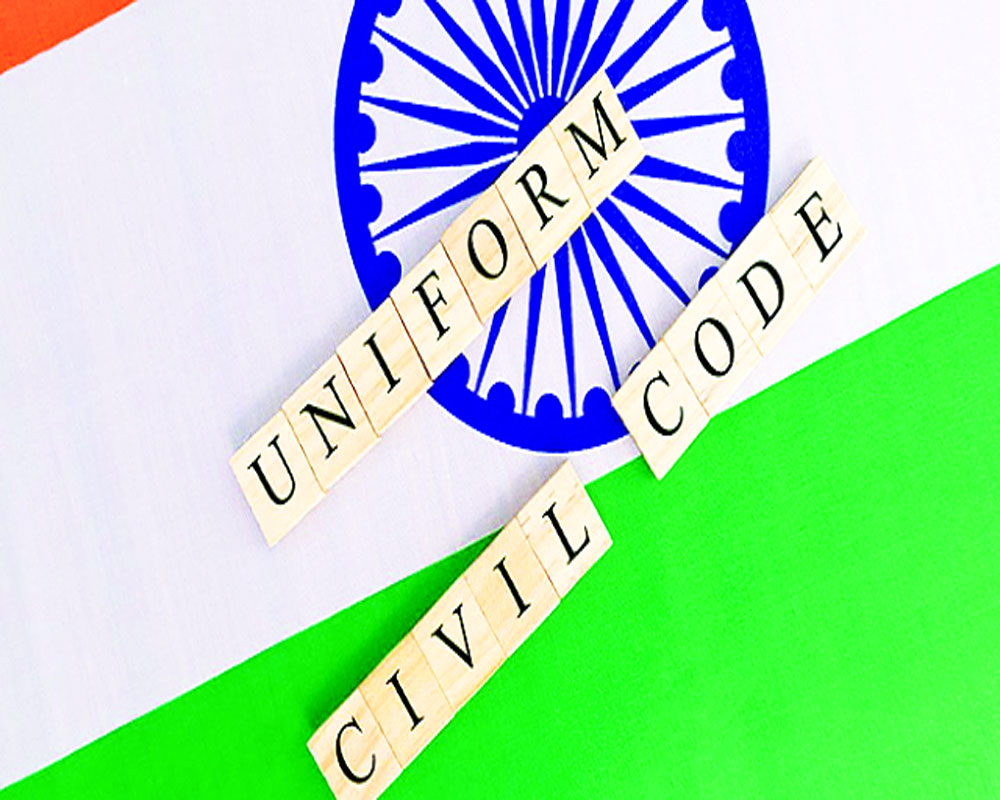Uniform Civil Code will be a big leap forward as it will bring about social change, gender equality and secularism in the country
Recently, the Law Commission of India has issued a notification asking all the stakeholders to give their opinion about the Uniform Civil Code (UCC) by 13th, July 2023. Prime Minister Narendra Modi has also said that there should be a common code for all citizens in the country. A new debate has now started in the country regarding this and various people, organizations and political parties are discussing it. Till June 29, the Law Commission had received 8.5 lakh responses on UCC.
In independent India, one of the guiding principles of our Constitution, which we adopted, is that the State shall endeavour to secure a ‘Uniform Civil Code’ (UCC) for its citizens. It is noteworthy that the Directive Principles for the State Policy, as written in the Constitution are part of the Article 44 of the Constitution. This means that the constitution expects the government, to make efforts to make laws and rules according to these directive principles of the state policy, but no time frame was fixed for complying with these directive principles. Also, there is no provision to implement them through court. Along with this, there are many other directive principles of the state policy, which have not yet been fully complied with, of which the law of 'cow protection' is also one. Although many state governments have enacted laws for cow protection, no law has been enacted by the central government in this regard.
Today, when a debate is going on, all over the country on the matter of making a Uniform Civil Code for all citizens, we need to understand that it is by the basic concepts of our Constitution. In our country, every citizen is equal before the law. But people having different faiths are governed by different personal laws. The majority Hindu society is governed by Hindu personal law, while the minority society (mainly Muslims) is governed by their respective personal laws. Significantly, these personal laws have been in force in society for a long time. It has to be understood that these personal laws are related to marriage, divorce, inheritance, adoption etc.
For a long time, it is being felt that there is a lack of uniformity in society due to different personal laws governing people of different religious faiths. At the same time, due to some historical and conservative influence, the personal laws of some religious groups are not in the best interest of various sections of their community, such as women and children. This hinders the optimisation of the welfare of the whole society. For example, for the past several centuries, Muslim society has had a very unequal and exploitative divorce system. The situation after that was even worse, if the husband of that woman wanted to re-marry his divorced wife, the only way was ‘Halala’, according to which, his ex-wife had to marry another man and had to go through the ordeal of living with her new husband, before marrying her previous husband, as per the dictate of Halala. Recently, thanks to the active support of the Central Government, and the intervention of the court, this system has been abolished and this triple talaq has been declared illegal. Provision of jail term has also been provided under the law, for the man giving triple talaq.
Meaning of Uniform Civil Code
Though, the tragedy of Muslim women has been reduced significantly by the abolition of triple talaq without there being any change in the personal law of Muslim society. But despite this, where according to the personal law of the Hindu society, there has been complete gender equality, but it was not so in the Muslim society. According to Hindu personal law, women have equal rights in inheritance, but this is not the case for Muslim women. Similarly, there are neither any equal rights between Muslim women and men in divorce nor marriage. That is, it can be understood that with the implementation of the Uniform Civil Code, the rights and status of women will improve significantly. It's worth noting that gender equality is a major goal set forth by global organizations, including the Sustainable Development Goals (SDGs), of the United Nations. That is, if the Uniform Civil Code is implemented, the country will take a giant leap forward in achieving these SDGs.
Due to different personal laws, there is discrimination between people of different religious faiths. For example, Muslim men are allowed to practice polygamy (up to four marriages), which is not the case for Hindu men. But after the implementation of the Uniform Civil Code, the evil practice like polygamy will be abandoned.
Though we claim that ours is a secular country, unless we adopt UCC in our country, real secularism cannot be achieved.By ending unequal personal law, UCC will also help in reducing disputes between the followers of different sects. At present, there are more legal disputes between the followers of different sects due to different personal laws. With the implementation of the Uniform Civil Code, steps can be taken towards a more peaceful and integrated society.
Challenges are very many
Immediately after independence, a Uniform Civil Code should have been implemented in the country by the basic spirit of the Constitution. But the leaders sitting in the corridors of power, fearing that the radical-minded people of some sects may not like the same, kept avoiding making UCC. This is the reason why these fundamentalists got emboldened and an atmosphere was created that if Uniform Civil Code is implemented then law and order in the country may be endangered. But the country has seen that when an exploitative system like triple talaq was abolished, they got full support from right-thinking people in society. Despite being opposed by some fundamentalists, it was greatly appreciated by the society at large, and the intelligentsia. There were also such moments in history when in the case of Shah Bano, the court gave a decision in favour of giving alimony to Muslim women, the then Congress government under the leadership of Shri Rajiv Gandhi overturned that decision by enacting a law and the rights of Muslim women were curtailed. In this way, the unequal treatment continued.
Various political parties will also work to foster their political agenda, under the policy of appeasement of minorities (Muslims) they can try their best to create obstacles in the way of implementation of the Uniform Civil Code, without any logic. Although Prime Minister Modi is lobbying strongly in favour of the UCC, in the coming days, when the Parliament will sit to pass the UCC Act in the country, not only the government, but the whole society will have to show firmness in this regard. We have to understand that ucc law is not an ordinary law, it will be a big leap forward to real social and gender equality, secularism and justice for women.
(The writer is Professor, PGDAV College, University of Delhi))

























